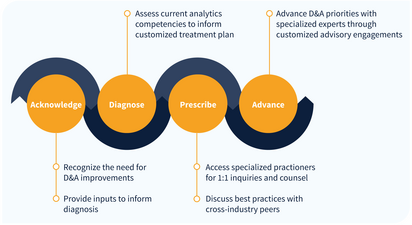Client Inquiry:
We’re launching a new data governance program. We have informal data stewards tasked with correcting data in our system of record, so they’re really data creators. I’m looking for advice on establishing a more formal stewardship community with roles and responsibilities.
Expert Takeaways:
Ownership
You’re in a classic example in which the people who collect data are not aware of the intended use. Therefore, there’s no motivation to ensure the quality of it because it doesn’t matter to them.
- Your stewards have probably been working in a backwards way. They fix something after the fact without realizing that there’s a process change that needs to be made. They do this over and over again.
- The sophistication of their process documentation is limited by their lack of data management skills. Also, they prefer not to have somebody telling them what to do.
- That’s a tough tightrope to walk because you’re not going to tell them they know nothing about how to do things. Avoid saying things like, “I’ve been tasked with formalizing this process and you now have to abide by.”
- Instead try, “I’ve been tasked with understanding how to ensure the quality of the information coming out of your department, and I will be seeking your feedback and expertise along the way.”
Sense of Collaboration
Focus on two or three main areas to start with and set up an exploratory committee to assess opportunities for improving analytics. “My job is to make sure the analytics come out well, and I’m looking for your opinions. Can you tell me about your workflow and how that data is used?”
- Come up with a set of questions to use as a basis for conversation. “Based on your input and our conversations with leadership, it appears that we’re missing some key information. How does this affect your day to day? Here’s how it’s affecting others.”
- After soliciting information, return with a synthesis report. “We asked you these questions so that we could benefit from your experience. Here are the commonalities in what each of you said, and here are our suggestions.”
- Use this as a way for them to come up with suggestions for roles and responsibilities. “I’d like to get your feedback on this. Let’s sit down together and go through this.”
- The goal is to have an effect without forcing it. Allow it to be their idea. You’re supporting them, you don’t need to take any credit.
Business Perspective
The only way to communicate the value is by reflecting it from a business perspective, not a data perspective.
- As data management professionals, we’re good at using data-profiling tools to count missing data and how often data is outside of a range. The question is not, how often is data outside of a range, but rather, when it is outside of range, how frequently does it impact the business?
- Articulate what consumers want in terms of a business data quality metric. For example, you need to know how many rooms are filled, and it needs to be accurate because there’s lots of money worth of decision making that is impacted when the numbers are wrong.
- Communicate with your main data suppliers to talk about root causes for incorrect metrics and why that’s relevant in terms of cost, such as revenue lost from state and federal sources. Allocate a percentage of that to each one of the sources so they have skin in the game. “For every dollar that we are miscalculating, X% is associated with this group.”
- “I need your ideas about how we can monitor the quality of this information, because I got to go back to the leadership and explain to her why our numbers are off and how that impacts our bottom line.”
“With the help of IIA Experts we were able to get multiple relevant perspectives on our issues quickly and efficiently without need for engaging expensive consultants.”
Expert Network
IIA provides guided access to our network of over 150 analytics thought leaders, practitioners, executives, data scientists, data engineers with curated, facilitated 1-on-1 interactions.
- Tailored support to address YOUR specific initiatives, projects and problems
- High-touch onboarding to curate 1-on-1 access to most relevant experts
- On-demand inquiry support
- Plan validation and ongoing guidance to advance analytics priority outcomes
- Monthly roundtables facilitated by IIA experts on the latest analytics trends and developments
